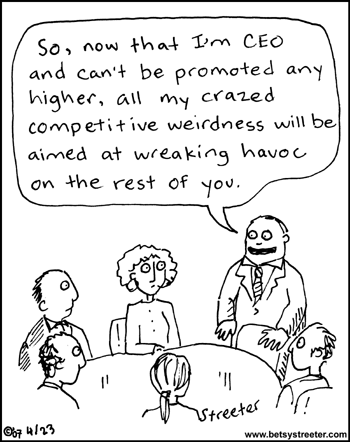People who know what they are talking about, talk about the Virginia Tech shootings.
Plus, this week, which began with the massacre at Virginia Tech, also marks the anniversaries of the shootings at Columbine and the bombing in Oklahoma City. In this hour, we'll talk with two psychologists about the mind of the mass murderer. Can knowing more about the people who commit these acts help us prevent future violence?
Listen to the podcast on Science Friday.
Thursday, April 26, 2007
Monday, April 23, 2007
Sunday, April 15, 2007
Saturday, April 14, 2007
Thursday, April 12, 2007
Tuesday, April 10, 2007
Monday, April 9, 2007
Sunday, April 8, 2007
Online Experiment for Print Magazine
The project offers another example of efforts by the print media to expand their digital presence in response to changing habits of both readers and advertisers. Last week, Lauren Rich Fine, who follows advertising and media stocks for Merrill Lynch, raised her estimates for the worldwide growth of online ad revenue for 2007 as well as 2008.
Saturday, April 7, 2007
Belief in reincarnation tied to memory errors
People who believe they have lived past lives as, say, Indian princesses or battlefield commanders are more likely to make certain types of memory errors, according to a new study.
The propensity to make these mistakes could, in part, explain why people cling to implausible reincarnation claims in the first place.
The propensity to make these mistakes could, in part, explain why people cling to implausible reincarnation claims in the first place.
Friday, April 6, 2007
Opt Out or Pushed Out?
On October 26, 2003, The New York Times Magazine jump-started a century-long debate about women who work. On the cover it featured “The Opt Out Revolution,” Lisa Belkin’s semipersonal essay, with this banner: "Why don’t more women get to the top? They choose not to." Inside, by telling stories about herself and eight other Princeton grads who no longer work full-time, Belkin concluded that women were just too smart to believe that ladder-climbing counted as real success.
Not true!
Here's the hugh report from the UC Hastings School of Law.
Not true!
Here's the hugh report from the UC Hastings School of Law.
Thursday, April 5, 2007
the brain is a "cobbled-together mess."
David Linden, a professor of neuroscience at Johns Hopkins University, doesn't see it that way. To him, the brain is a "cobbled-together mess." Impressive in function, sure. But in its design the brain is "quirky, inefficient and bizarre ... a weird agglomeration of ad hoc solutions that have accumulated throughout millions of years of evolutionary history..."
This is just what I've been trying to describe to my social psych classes in describing Wilson's idea of the adaptive unconscious.
This is just what I've been trying to describe to my social psych classes in describing Wilson's idea of the adaptive unconscious.
Perks at Wal-mart
At Wal-Mart, Lessons in Self-Help
The program, to be announced today, tests the assumption, if not conventional wisdom, that environmentalism and fitness are luxuries of the well-off, inaccessible to a vast number of the nation’s working class because of hectic schedules, stretched budgets and bad habits.
The program, to be announced today, tests the assumption, if not conventional wisdom, that environmentalism and fitness are luxuries of the well-off, inaccessible to a vast number of the nation’s working class because of hectic schedules, stretched budgets and bad habits.
Wednesday, April 4, 2007
Time in the animal world
http://www.nytimes.com/2007/04/03/science/03time.html?ex=1333425600&en=c983aa1f96b5a3c5&ei=5124&partner=permalink&exprod=permalink
Several experiments are described. Notice how difficult it was to design experiments to test the hypothesis and how the experimental results are interpreted to support the hypotheses.
Several experiments are described. Notice how difficult it was to design experiments to test the hypothesis and how the experimental results are interpreted to support the hypotheses.
Salient Ads
Ads need to catch your attention to work.
And if the ad makes you feel good, via engendering a "it's cool" response, then you may connect that emotion to the ad or brand. Regardless, billboards usually can't created attitude change along the central route -- usually there's not enough cognitive ability.
And if the ad makes you feel good, via engendering a "it's cool" response, then you may connect that emotion to the ad or brand. Regardless, billboards usually can't created attitude change along the central route -- usually there's not enough cognitive ability.
Subscribe to:
Posts (Atom)



